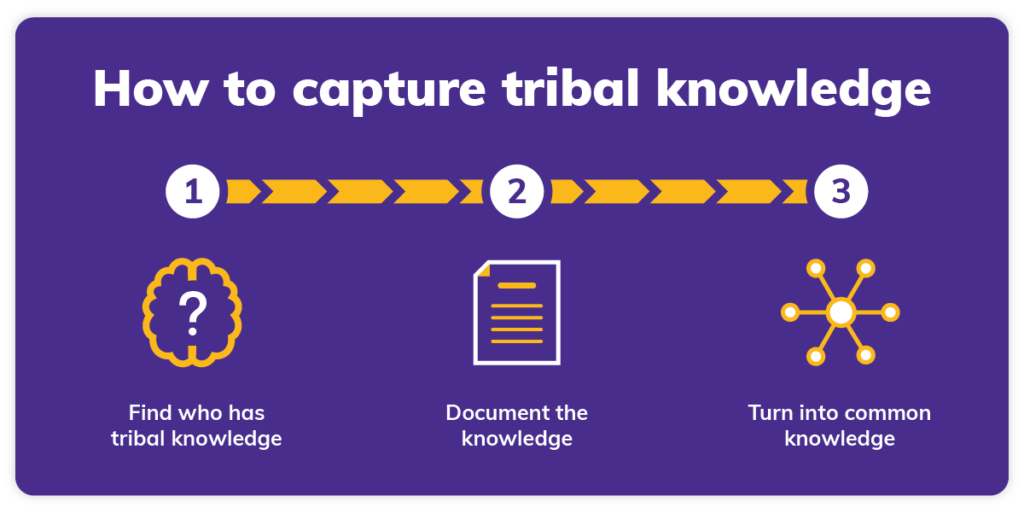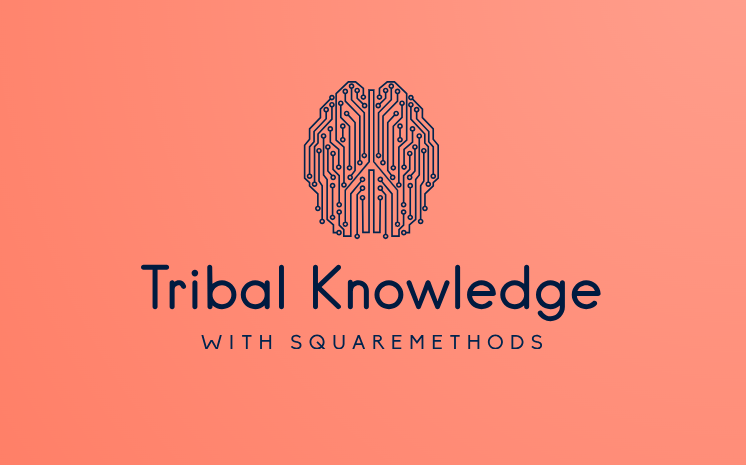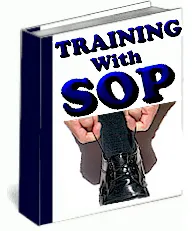Tribal knowledge refers to the unwritten, informal information, expertise, and insights that are possessed by individuals within a group or organization. It includes practical know-how, lessons learned, best practices, and other valuable insights that may not be documented or formally taught. This knowledge is often shared through word of mouth, personal experiences, anecdotes, and informal interactions among members of the group.
Capturing tribal knowledge is important for preserving institutional memory, enhancing organizational learning, and ensuring that critical information is not lost when individuals leave or transition within the organization. Here are some tips on how to capture tribal knowledge:

- Identify Key Experts: Identify individuals within the organization who possess valuable knowledge and expertise in specific areas. These experts may include long-time employees, subject matter experts, or individuals with unique experiences and skills.
- Encourage Knowledge Sharing: Create a culture that encourages knowledge sharing and collaboration. Provide opportunities for employees to share their experiences, insights, and best practices through meetings, workshops, informal discussions, and collaboration platforms.
- Document Informal Practices: Document informal practices, processes, and procedures that are not formally documented. This may involve conducting interviews or discussions with key stakeholders to gather insights and document undocumented knowledge.
- Utilize Technology: Use technology platforms and tools to capture, organize, and disseminate tribal knowledge. This may include knowledge management systems, wikis, intranets, and collaboration tools that facilitate sharing and access to information.
- Create Knowledge Repositories: Establish centralized repositories or databases to store captured tribal knowledge. Organize the information in a structured manner and make it easily accessible to employees who may need it.
- Provide Training and Mentorship: Implement training programs and mentorship initiatives to transfer knowledge from experienced employees to newer hires or less-experienced staff members. Encourage mentoring relationships and knowledge exchange between employees at different levels within the organization.
- Document Lessons Learned: Encourage individuals to document lessons learned from past experiences, projects, and initiatives. Create templates or guidelines for capturing lessons learned and make it a standard practice within the organization.
- Facilitate Cross-Functional Collaboration: Encourage collaboration and knowledge sharing across different departments, teams, and functional areas within the organization. Foster opportunities for cross-functional projects, joint problem-solving, and peer learning.
- Recognize and Reward Knowledge Sharing: Recognize and reward employees who actively participate in knowledge sharing initiatives and contribute valuable insights and expertise to the organization. This can help reinforce a culture of knowledge sharing and collaboration.
- Regularly Review and Update: Regularly review and update captured tribal knowledge to ensure that it remains accurate, relevant, and up-to-date. As the organization evolves and new experiences are gained, continue to capture and document new insights and best practices.
Certainly! Leveraging a digital Standard Operating Procedure (SOP) platform like “SquareMethods” can significantly enhance the documentation and dissemination of tribal knowledge within an organization. Here’s how you can incorporate SquareMethods into the process of capturing tribal knowledge:
- Centralized Documentation: Utilize SquareMethods as a centralized platform for documenting tribal knowledge. Create dedicated sections or categories within SquareMethods to capture various types of informal practices, lessons learned, best practices, and expertise shared by employees.
- Structured Templates: Develop standardized templates within SquareMethods for documenting tribal knowledge. These templates can include fields for capturing key information such as the context of the knowledge, the individuals involved, lessons learned, best practices, and any relevant resources or references.
- Tagging and Categorization: Use tagging and categorization features in SquareMethods to organize tribal knowledge into relevant topics, themes, or areas of expertise. This makes it easier for users to search for and access specific pieces of knowledge based on their interests or needs.
- Version Control and History: Leverage SquareMethods’ version control and history tracking capabilities to keep track of changes made to tribal knowledge documentation over time. This ensures transparency and accountability while allowing users to refer back to previous versions if needed.
- Access Control and Permissions: Configure access control and permissions settings in SquareMethods to ensure that tribal knowledge is accessible to authorized users within the organization while maintaining confidentiality and security where necessary.
- Integration with Collaboration Tools: Integrate SquareMethods with other collaboration tools and platforms used within the organization, such as project management software, communication tools, and document sharing platforms. This allows for seamless sharing and access to tribal knowledge across different workflows and teams.
- Training and Onboarding: Incorporate SquareMethods into training and onboarding processes to familiarize employees with the platform and encourage them to actively contribute to documenting tribal knowledge. Provide guidance and resources on how to effectively use SquareMethods for knowledge capture and sharing.
- Regular Updates and Maintenance: Establish procedures for regularly updating and maintaining tribal knowledge documentation within SquareMethods. Encourage users to review and update existing content based on new experiences, insights, or changes within the organization.
- Feedback Mechanisms: Implement feedback mechanisms within SquareMethods to gather input and suggestions from users regarding the usability, relevance, and effectiveness of tribal knowledge documentation. Use this feedback to continuously improve the platform and the quality of captured knowledge.
- Promotion and Recognition: Promote the use of SquareMethods for capturing tribal knowledge and recognize employees who actively contribute valuable insights and expertise to the platform. Highlight success stories and examples of how tribal knowledge documentation has benefited the organization as a whole.
By incorporating SquareMethods into the process of capturing tribal knowledge, organizations can effectively preserve and disseminate valuable expertise, insights, and best practices, fostering a culture of continuous learning and improvement.



